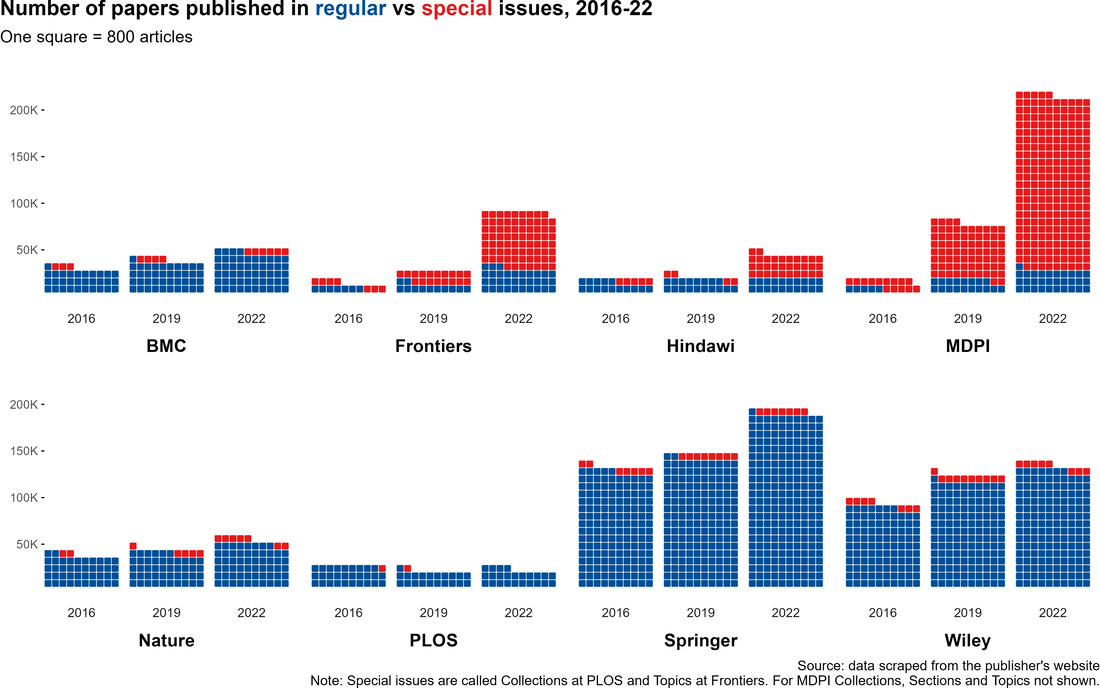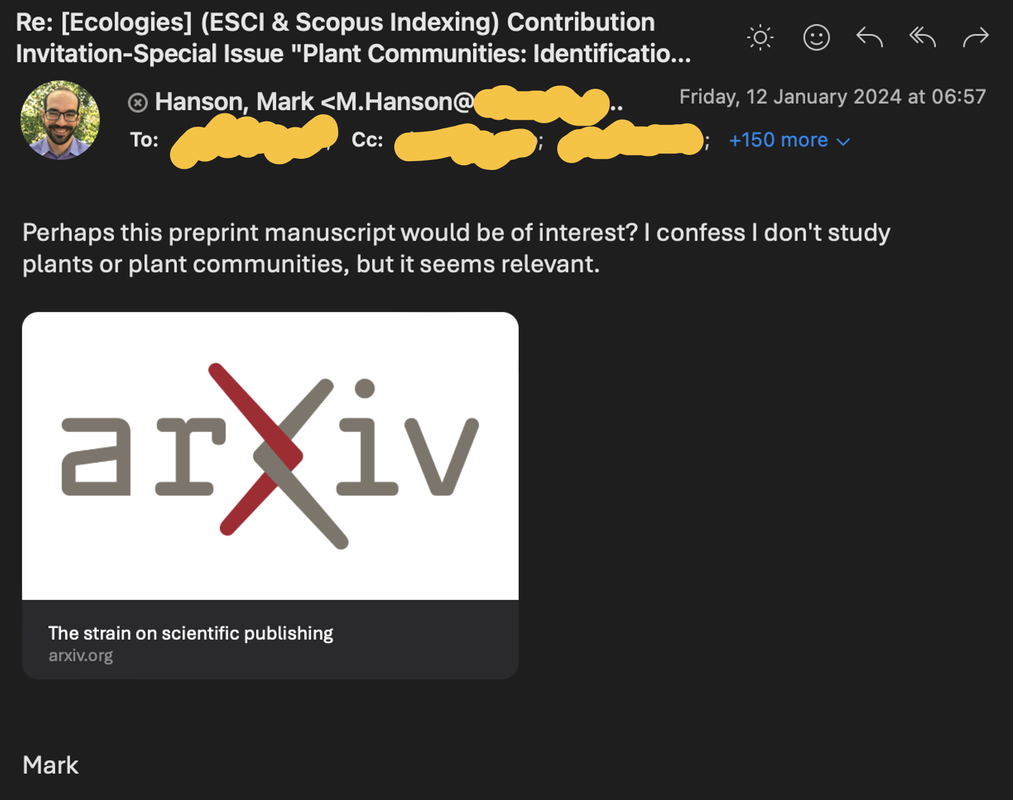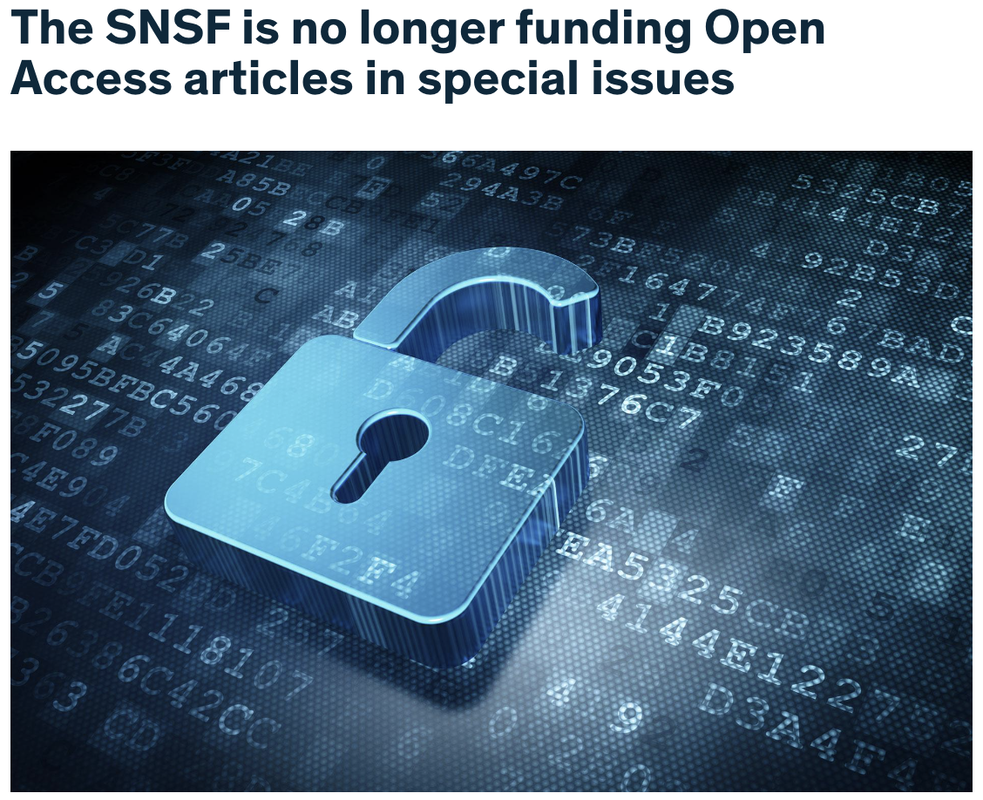|
Reading time: 13 minutes
TLDR: "Think piece" and "Frankenstein" Special Issues are very different things. We should really be distinguishing them from each other. It's publishers that profit off of free guest editor work that want us to view all things called "Special Issues" as similar products. They aren't, and we need terms that define a spectrum for what goes into editing a "Special Issue."
Figure: Special Issue (red) and Regular Issue (blue) articles by publisher from The strain on scientific publishing.
So you may have read a preprint recently: "The strain on scientific publishing." I found the topic fascinating; heck, I was lead author. In that preprint, we highlighted two mechanisms of publisher growth that generates strain, one of which was the use of "Special Issues" (emphasis on the air quotes). Some publishers have adopted Special Issues as an outlet for publishing guest-edited articles en masse. Now, our preprint took off across the globe, being covered in English, Spanish, Arabic, and Swahili... just to name a few. Somewhat as a result, we've even been attacked by Frontiers Media for somehow being "anti-special issue," which is the topic of today's post: am I anti-special issue? I don't think so. After all, I just finished editing one.
What is a journal?
|
|||||||||||||||||||||||||||||||||||||||||||||||||||||||||
|
|
Phil Trans B |
MDPI |
|
Number of special issues per year |
24 |
No limit (some journals host >3000 per year) |
|
Length of submitted proposal text |
10-15 pages (approx.) |
150-200 words |
|
Article release schedule |
Simultaneous upon final article being ready |
Rolling release of articles upon acceptance |
But the differences between these groups go beyond what can be summed up above. Perhaps the biggest difference between Phil Trans B and MDPI strikes at the heart of this blogpost: earlier I defined Special Issues as: "guest-edited article collections hosted by journals on a research topic."
I also said: "doesn't it feel like something's missing here?"
An article collection with "pizzazz"
OR: what makes a special issue "special"
Here I've summarized what is asked for in each journal's Special Issue proposal form. I've selected MDPI's International Journal of Molecular Sciences (IJMS), which is one of their flagship journals, to download their proposal form.
| Phil Trans B proposal form (pdf) | |
| File Size: | 127 kb |
| File Type: | |
| MDPI proposal form (pdf) | |
| File Size: | 183 kb |
| File Type: | |
|
Phil Trans B (10+ pages) |
MDPI: IJMS (1-2 pages) |
|
Title (150 characters) and summary (100-200 words) |
Title and 150-200 word short description |
|
Justification for why a collection is valuable, rather than publishing articles individually (500 words) |
List of 8 potential papers or 20 potential authors |
|
Comment on expected/aspired impact (300 words), |
|
|
5 key recent papers in the field that have inspired this topic |
|
|
Brief summary of the editor(s) contributions to the field |
|
|
Has the topic been covered elsewhere (publications, symposia)? |
|
|
Why is this topic suited to a Phil Trans B special issue, rather than a more specialist journal or book? |
|
|
Proposed articles, including authors, titles, and abstracts already planned and submitted to guest editors in advance of making a formal proposal to Phil Trans B (14-18 suggested) |
|
|
Summary of author demographics (diversity, inclusivity, career stage) and justification for the list of authors chosen |
|
Please keep in mind: these are both proposal forms intended for the same relative stage of readiness. Now... Phil Trans B does encourage aspiring guest editors to reach out in advance with a pre-submission enquiry, and among the formal proposals they do receive, they claim a proposal rejection rate >50%: "Publishing in Phil Trans B is prestigious and the competition stiff, so we can only accept fewer than half of the proposals submitted." But both of these proposal forms are what the journal asks for prior to your proposal being accepted.
One of the most striking details though is how Phil Trans B emphasizes the need for the topic to be... well... "special." Before the formal proposal, Phil Trans B provides further guidance on pre-submission enquiries: they ask would-be guest editors to justify why the topic would be timely within the next 18 months, how the issue would be novel and advance the field, and note implications it would have for the wider scientific community or implications on guiding policy.
How does MDPI compare?
In their "Detailed guide on Special Issue proposals," MDPI requests the following information:
- Title, a summary that outlines the background, the aims for the special issue, and a list of topics to be covered (but keep the summary to 150-200 words), and 3-10 keywords
- Info for at least 8 planned papers or a list of 20 potential authors
- A customized "Call for papers" written letter, which will be used to invite authors to contribute articles (optional)
- The plan to promote the special issue to attract article contributions (optional)
Yes, you're reading that correctly: at no point does MDPI actually ask you to justify why your Special Issue would be timely, novel, important, or otherwise "special." They give just 150-200 words for you to sum up all pertinent information of the proposal, and in their guidance, they state only that: "The Guest Editor must ensure the published content within the Special Issue is in line with the title and stated scope of the journal." While Phil Trans B asks for a proposal containing a full list of authors, titles, and abstracts that will make up the content of the issue, MDPI just requests that you provide 20 names and emails; as best I can tell, there's no requirement you actually know any of the authors you mention, much less confirmation that they would welcome an invitation to contribute to the proposed Special Issue. MDPI further says: "The editorial office can help you contact scholars by either providing you with a list of potential contributors or sending out invitations on your behalf." This is how you get email spammed: they "help you contact scholars" by sending emails to hundreds of authors based solely on keyword matches. I know they're also clearly still doing this because a couple months ago I was invited to contribute to an MDPI special issue on plant communities (not at all my field), but here's the kicker: the editor had accidentally put invitee emails in the cc list, and not bcc; all 150+ of them. I responded back like so, with a in-line link to our "The strain on scientific publishing" preprint:
|
Note: in response, I got two emails from "Ms. Libby Liu" of the MDPI Ecologies editorial office asking if I could email a .pdf of my article for screening. I should really stress this invitation was in Jan 2024, and our preprint came out in late Sept 2023. Not only do I have literally no research backround in plant community structures, but this invite even came after the preprinting of our article, which we sent to MDPI and which MDPI commented on publicly. You'd think I'd be on a "no call" list or something...
|
On the other hand, MDPI basically just asks you to name a topic and they'll be happy to get you articles for it. In Phil Trans B, over a year in advance of the issue being published, the guest editors have already contacted their full author list to get commitments for article content to be submitted to the issue before they're even guaranteed a special issue. In MDPI, it's not even clear what articles the special issue will ultimately contain, who will write them, or what they will cover beyond some broad keywords.
We need a new lexicon
OR: the bastardization of the phrase "special issues" needs to stop
Through their aggressive email campaigns, groups like MDPI define the curriculum for (indoctrinate?) many thousands of scientsts, authoring and editing hundreds of thousands of articles annually. They teach that Special Issues are a box-ticking exercise almost anyone can and should do if they'd like. All semblance of "special" is removed from this framing of guest-edited article collections. If we want to "make special issues special once again" (Priem, 2007), we need a new term.
Totally missing from the MDPI-esque definition of "Special Issue" is the idea that the articles within are intended to be read together, rather than as stand-alone works. So with that in mind let me know if this hits home for you: a Special Issue like those hosted by Phil Trans B are "think piece" Special Issues, while open call issues with no concept of the ultimate product (like those hosted by MDPI and others) are "Frankenstein" Special Issues. One has forethought put into it, while the other is designed to be an assemblage of whatever body parts the guest editors can muster.
|
And to be clear: this will be a spectrum. For instance, eLife has just put out a call for papers to contribute to a "Focus Issue" on trained immunity, where there will be a mix of open submissions and review articles from researchers hand-picked by the editors.
|
Collateral damage
OR: Open Science done right is worth defending
|
The Swiss National Science Foundation (SNSF) recently updated their funding policies to stop paying the Open Access fees associated with "special issues." This is a blanket policy. Because of the immense number of articles published by groups like MDPI, this strategy taken by the SNSF is fairly effective at striking back primarily at publishers that adopted the term "Special Issues" to enable their exponential growth editorial practices. Others (including Frontiers and their partner journal IJPH) have also attacked our work in the wake of, or even explicitly citing, the SNSF decision.
|
Conflicts of interest
OR: why even "good" Special Issues often aren't great
For now, let me just say I'm overall pleased with how my special issue turned out (and my comments here also apply to my co-editors!). I had a number of colleagues from across the globe who were doing really neat work. By guest editing, I was able to give them an outlet to write a review or publish their research, where as editor, I could influence the work to be part of a cohesive issue. To my great pleasure, some of my colleagues even took a chance on starting a conversation. They wrote pieces that reflected on recent studies in the field, found a niche that needed filling, or really made a leap of faith that readers would find their unique thoughts on the state of a contentious field to be valuable in guiding and interpreting future work.
And as mentioned above, "think piece" Special Issues can turn out to be flops. Those leaps of faith might be off base; my own included. But that is precisely what a Special Issue does best: Special Issues are a meritocratic system that give prominent authors a chance to step outside the safe, stuffy, boring confines of rigorously peer-reviewed science: it gives them a chance to not only talk about what they and others have recently accomplished, but also what they think about it. Some of their thoughts will fail to land, but others just might succeed. The wonderful thing about strong-link problems, like advancing whole scientific fields, is that we'll ultimately ignore the failures and build on the successes.
My own special issue began planning in summer 2022. By Spring 2023 we'd not only received a full list of abstracts and article commitments from authors, we shared those abstracts with all authors so they could see what others would be writing on. When first drafts of manuscripts came in, we shared those as well. That way, related articles could feed off each other, synergizing to avoid having to write in tangents, or adding nods to other articles that furthered a particular point of discussion. The issue was enabled as a cohesive unit from start to finish, and while I'll always see room for improvement as an editor, I think it came out pretty well.
Sorry this got away from me a bit, but thanks for sticking it out to the end.
Cheers,
Mark
References
Priem, R. 2007. Let's Make Special Issues “Special†Once Again. Journal of Management Inquiry, 16(3), 246-249. https://doi.org/10.1177/1056492607302413
SNSF. 2023. The SNSF is no longer funding Open Access articles in special issues. Accessed Mar 18, 2024. URL: www.snf.ch/en/g2ICvujLDm9ZAU8d/news/the-snsf-is-no-longer-funding-open-access-articles-in-special-issues
Leave a Reply.
Author
Mark
Archives
March 2024
March 2023
February 2023
October 2022
April 2022
December 2021
October 2021
March 2021
June 2020
November 2019







 RSS Feed
RSS Feed
